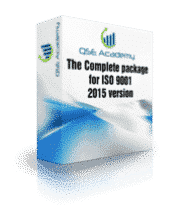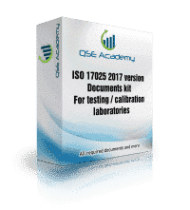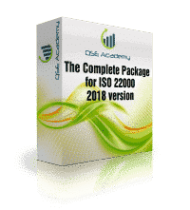ISO 26000 2012-Paket
2024-10-28 11:05ISO 26000 2012 Package
Holen Sie sich Ihre Akkreditierung zu den geringstmöglichen Kosten


ISO/IEC 26000 2012 complete package
Fassung 2012
Preis : 389 $
The complete ISO/IEC 26000 2012 package is a comprehensive document package that contains everything from all the templates of procedures, processes, forms, checklists, tools, detailed guides and instructions needed to:
- Start your ISO/IEC 26000 process.
- Erstellen Sie Ihre ISO/IEC 26000 documentation.
- Schneller Zugriff auf ISO/IEC 26000 accreditation.
- Profitieren Sie von einer ISO/IEC 26000 management system that is simple and adapted to the needs of your organization.

Warum mit einer leeren Seite beginnen? Starten Sie Ihr Projekt HEUTE und sparen Sie bis zu 80% an Zeit und Geld.

Dieses Paket beinhaltet eine einstündige Live 1-to-1 Online-Sitzung mit einem ISO-Berater, Dokumentenprüfungen, kontinuierlichen E-Mail-Support für 12 Monate und einen regelmäßigen Update-Service.

Kosteneffiziente Implementierung: Viel billiger als ein Berater vor Ort und viel weniger zeitaufwendig als eine Neuentwicklung
ISO/IEC 26000 2012 Version Complete Package
- Zusätzlicher Wert: All ISO/IEC 26000 2012 Die Anforderungen wurden zu einem effizienten Prozess entwickelt. Das fügt hinzu operativer Wert für Ihr Labor und erhöht folglich die Produktivität.
- Wirksam: Minimaler Aufwand ist erforderlich die erforderlichen Verfahren zu befolgen alle Anforderungen der ISO/IEC zu erfüllen 26000.
- Vereinfacht: Bürokratie und übermäßiger Papierkram wurden aus allen Prozessen entfernt, um sie zu vereinfachen - und das bei voller Einhaltung der ISO-Normen./IEC 26000 2012.
Starten Sie Ihr Projekt HEUTEund sparen Sie bis zu 80% an Zeit und Geld.
The all-in-one document package for ISO/IEC 26000 2012 version
Sparen Sie Zeit und Geld und vereinfachen Sie das Akkreditierungsverfahren.
Dokumente enthalten:

Formulare
👉 Dieses Paket bietet Ihnen die folgenden Funktionen:
- Vollständig Lebensdauer Zugang
- Zugriff auf einem Laptop, Desktop und Handy
Bescheinigung über den Abschluss
Dieses Paket enthält:
Verfahren:
- Verfahren zur Entwicklung der CSR-Politik
- Verfahren zur Identifizierung und Einbeziehung von Stakeholdern
- CSR-Risikobewertung und Managementverfahren
- CSR-Leistungsbewertung und Berichtsverfahren
- Verfahren zur Umsetzung und Überwachung des CSR-Programms
- CSR-Schulung und Sensibilisierungsverfahren
- CSR-Verfahren zur Einhaltung rechtlicher und regulatorischer Vorschriften
- CSR-Kommunikation und Offenlegungsverfahren
- CSR Supply Chain Management Verfahren
Aufzeichnungen und Formulare:
- Formular zur Genehmigung der CSR-Politik
- Aufzeichnung des Engagements von Stakeholdern
- CSR-Risikoregister
- CSR-Aktionsplan
- CSR-Leistungsbericht
- Teilnahme an CSR-Schulungen
- Checkliste zur CSR-Einhaltung
- Stakeholder-Feedback-Formular
- Formular für den CSR-Vorfallbericht
- CSR-Bewertungsformular für Lieferanten

Handbuch und Qualitätspolitik
- ISO 26000 v 2012 Handbuch zur sozialen Verantwortung der Unternehmen (CSR)

SOPs
- SOP für die Durchführung einer CSR-Lückenanalyse
- SOP für die Festlegung von CSR-Zielen und Zielvorgaben
- SOP für die Integration von CSR in die Unternehmensstrategie
- SOP für die interne CSR-Prüfung
- SOP für die Eskalation und Lösung von CSR-Problemen
- SOP für die Überprüfung und kontinuierliche Verbesserung des CSR-Programms
- SOP für externe CSR-Berichterstattung und Zertifizierung
- SOP für die Identifizierung und Verwaltung von CSR-Partnerschaften und Kooperationen
- SOP für Krisenmanagement im CSR-Kontext
- SOP für CSR-Budgetierung und Ressourcenzuweisung
Comprehensive Guide to ISO 26000:2010: Chapter-by-Chapter Breakdown of Social Responsibility Standard
Kapitel 1: Anwendungsbereich
This chapter defines the purpose and scope of ISO 26000:2010, outlining its role in guiding organizations toward adopting socially responsible behavior.
Wichtige Anforderungen:
- Anwendbarkeit: ISO 26000 applies to all types of organizations, regardless of their size, sector, or location. It is meant to help organizations contribute to sustainable development by promoting socially responsible practices.
- Voluntary Nature: The standard is not designed for certification or compliance auditing but rather serves as a guide to help organizations operate in a more ethical and transparent manner.
Chapter 2: Terms and Definitions
This chapter provides the definitions of key terms and concepts used throughout ISO 26000 to ensure consistent understanding of social responsibility principles.
Wichtige Anforderungen:
- Wichtige Terminologie: Definitions of critical terms like “social responsibility,” “stakeholder,” “sustainable development,” and “ethical behavior” are provided to clarify the standard’s framework and goals.
- Stakeholder Definition: Stakeholders are defined broadly as individuals or groups affected by, or capable of influencing, the organization’s decisions and activities.

Chapter 3: Understanding Social Responsibility
This chapter introduces the concept of social responsibility, explaining its importance in modern business practices and its role in sustainable development.
Wichtige Anforderungen:
- Understanding Social Responsibility: Organizations need to understand the core idea of social responsibility, which is the commitment to act ethically, contribute to economic development, improve the quality of life, and minimize environmental impacts.
- Principles of Social Responsibility: The chapter outlines seven core principles of social responsibility that all organizations should follow:
- Accountability: Being responsible for the impacts of an organization’s decisions and actions.
- Transparency: Being open about decisions and activities that impact society and the environment.
- Ethical Behavior: Adopting behavior that is based on honesty, fairness, and integrity.
- Respect for Stakeholder Interests: Considering the interests of all stakeholders impacted by the organization.
- Respect for the Rule of Law: Complying with local and international laws.
- Respect for International Norms of Behavior: Adhering to internationally accepted standards of behavior.
- Respect for Human Rights: Supporting and promoting the protection of human rights.
Chapter 4: Principles of Social Responsibility
This chapter elaborates on the key principles of social responsibility and how organizations can integrate these principles into their operations.
Wichtige Anforderungen:
- Integration into Organizational Culture: The principles of social responsibility should be embedded in the organization’s culture, values, and decision-making processes.
- Ethical Decision-Making: Ethical behavior should guide all aspects of the organization’s operations, including relationships with employees, customers, communities, and the environment.
- Engagement der Interessengruppen: Organizations must engage with their stakeholders and consider their expectations and needs in decision-making processes.
Chapter 5: Recognizing Social Responsibility and Engaging Stakeholders
This chapter focuses on how organizations can identify their social responsibilities and engage with their stakeholders effectively.
Wichtige Anforderungen:
- Identifying Social Responsibilities: Organizations need to identify their areas of social responsibility by considering their impacts on the environment, society, and economy.
- Stakeholder Identification and Engagement: Effective stakeholder engagement requires identifying the individuals, groups, or entities that are affected by the organization’s activities or who have the ability to influence its decisions.
- Kommunikation: Transparent, open, and continuous communication is necessary for meaningful engagement with stakeholders.
Chapter 6: Guidance on Core Subjects of Social Responsibility
This chapter provides detailed guidance on the seven core subjects of social responsibility, helping organizations identify where they can have the most positive impact.
Wichtige Anforderungen:
- Organizational Governance:
- Ethical and transparent governance structures are fundamental for embedding social responsibility in decision-making processes.
- Human Rights:
- Respect for human rights, including fair treatment, non-discrimination, and the right to safe working conditions, is crucial. Organizations must avoid complicity in human rights abuses.
- Labor Practices:
- Fair treatment of employees, including respecting workers’ rights, ensuring safe working conditions, and providing fair wages and benefits, is essential.
- The Environment:
- Organizations must minimize their environmental footprint, focusing on sustainable resource use, reducing emissions and waste, and promoting biodiversity conservation.
- Fair Operating Practices:
- Ethical behavior in business dealings, including anti-corruption efforts, responsible marketing, and fair competition, should be promoted.
- Consumer Issues:
- Organizations should act responsibly toward consumers, ensuring product safety, transparent communication, and fair business practices.
- Community Involvement and Development:
- Active engagement in the community, promoting social development, education, and welfare, is encouraged for organizations to positively contribute to the societies in which they operate.
Chapter 7: Integrating Social Responsibility Throughout the Organization
This chapter outlines how organizations can integrate social responsibility into their policies, practices, and operations.
Wichtige Anforderungen:
- Policy Development: Organizations must develop and adopt policies that reflect their commitment to social responsibility. These policies should be aligned with the organization’s mission and stakeholder expectations.
- Embedding Social Responsibility in Processes: Social responsibility should be incorporated into core business processes, including strategy development, operations, and performance monitoring.
- Setting Objectives and Targets: Organizations should establish measurable objectives and targets for social responsibility initiatives, tracking progress and adjusting strategies as needed.
- Training and Capacity Building: Employees at all levels should be trained to understand the organization’s social responsibility goals and their roles in achieving them.
Chapter 8: Communication on Social Responsibility
This chapter focuses on how organizations should communicate their social responsibility efforts internally and externally.
Wichtige Anforderungen:
- Internal Communication: Ensure that employees and internal stakeholders are aware of the organization’s social responsibility commitments and how they contribute to these goals.
- External Communication: Transparent communication with external stakeholders, including customers, partners, and communities, is vital for building trust. This can include sustainability reports, stakeholder meetings, and public disclosures.
- Accuracy and Transparency: All communication about social responsibility should be truthful, clear, and accessible, ensuring that stakeholders can understand the organization’s performance in this area.
Chapter 9: Enhancing Credibility in Social Responsibility
This chapter addresses how organizations can enhance the credibility of their social responsibility claims and practices.
Wichtige Anforderungen:
- Third-Party Verification: Organizations can enhance credibility by seeking independent verification of their social responsibility practices through audits, certifications, or external assessments.
- Transparency in Reporting: Accurate and transparent reporting of social responsibility efforts helps organizations build credibility and trust with their stakeholders.
- Kontinuierliche Verbesserung: Organizations must commit to continuously improving their social responsibility practices and demonstrating their progress over time.
Chapter 10: Reviewing and Improving Social Responsibility Practices
This chapter emphasizes the need for ongoing review and improvement of social responsibility strategies and initiatives.
Wichtige Anforderungen:
- Performance Monitoring: Organizations should regularly monitor and evaluate their performance in social responsibility areas, using key performance indicators (KPIs) where appropriate.
- Management Review: Regular management reviews should be conducted to assess the effectiveness of social responsibility initiatives and to identify opportunities for improvement.
- Kontinuierliche Verbesserung: Based on performance reviews and stakeholder feedback, organizations should refine their social responsibility policies and processes to enhance their impact.
90 Tage Geld-zurück-Garantie

Wenn Sie aus irgendeinem Grund innerhalb der ERSTEN 90 Tage nach Ihrem Kauf nicht zufrieden sind, wenden Sie sich einfach an support@qse-academy.com und unser Support-Team wird Ihnen sofort eine vollständige Rückerstattung zukommen lassen.
Das Paket enthält alle Dokumente, die Sie benötigen, um die ISO/IEC 17025 2017 zu erfüllen - diese Dokumente sind für das Akkreditierungsaudit voll akzeptabel.
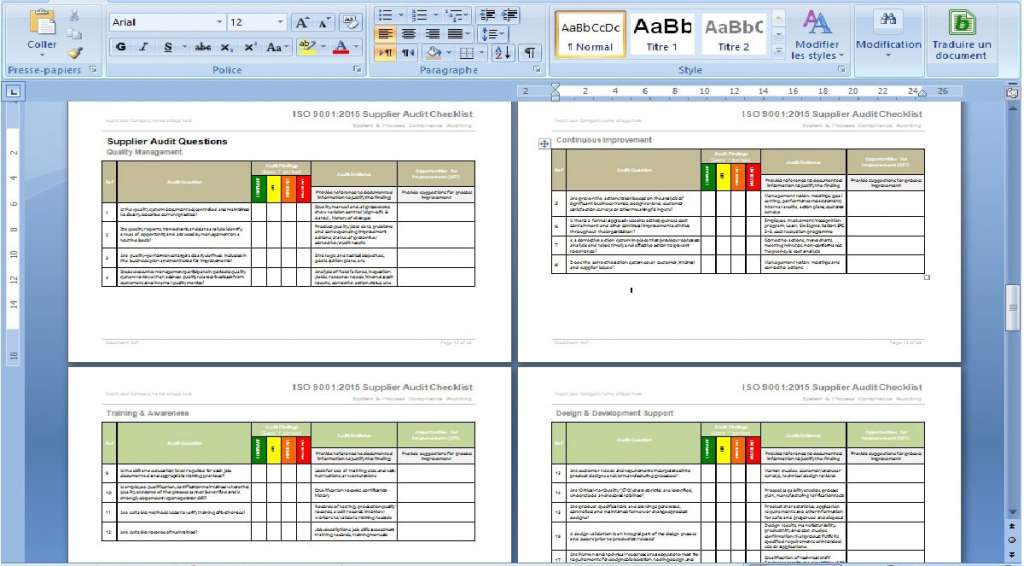
Alle Dokumente liegen in MS Word oder MS Excel vor, so dass sie sehr einfach an Ihr Unternehmen angepasst werden können. Sie können sie anpassen, indem Sie Firmenlogos und Farben hinzufügen und Kopf- und Fußzeilen bearbeiten, um sie an Ihren bevorzugten Stil anzupassen.

Wir haben bereits etwa 90% der in den Dokumenten geforderten Informationen ausgefüllt. Um sie auszufüllen, müssen Sie nur den Namen des Unternehmens, die verantwortlichen Personen und alle anderen Informationen, die für Ihr Unternehmen typisch sind, angeben. Sie werden durch den Prozess geführt, wobei die Elemente, die benötigt werden, und die, die optional sind, kommentiert werden.
We presented the ISO 26000 documentation, so as to assure all its users that they have completed everything accurately and with the utmost efficiency.
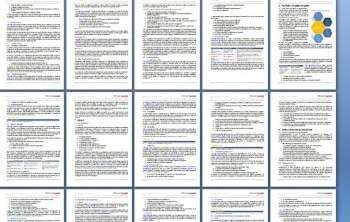
Alle Dokumente sind so gestaltet, dass Sie die vorgeschlagene Reihenfolge perfekt nachvollziehen können. So können Sie sicherstellen, dass nichts fehlt und niemand verloren geht.
Die beigefügten Kommentare und Flussdiagramme helfen Ihren Mitarbeitern, jedes Dokument und seinen Nutzen zu verstehen, was Ihnen hilft, das Qualitätsmanagement flüssiger und die Prozesse einfacher zu gestalten.
Features of the complete ISO/IEC 26000 2012 Kit
Preis: 389 $
– Documentation included: 58 documents for the implementation of ISO 26000
- MS Office 2007-Format, MS Office 2010, MS Office 2013
- Sprache: Englisch
- Die Dokumente sind vollständig bearbeitbar - geben Sie einfach die für Ihr Unternehmen spezifischen Informationen ein.
– Acceptable for the ISO 26000 2012 accreditation audit? Yes, all the documents required by ISO 26000 2012 are included, as well as the quality policy and the current but optional procedures.
Sofortige Lieferung - Das Paket ist sofort nach dem Kauf herunterladbar
Kostenlose Beratung - Darüber hinaus können Sie zwei vollständige Unterlagen zur Prüfung durch Fachleute einreichen.
Erstellt für Ihr Unternehmen - Die Modelle sind für kleine und mittlere Unternehmen optimiert.


Complete ISO/IEC 26000 2012 Package
The complete kit to implement ISO/IEC 26000
Preis : 389 $
Gesamtdauer der Umsetzung: 8 Monate
ISO/IEC 26000 Implementation Project Plan
Das Erreichen der ISO 17020 ist ein wichtiger Meilenstein für jede Organisation und bedeutet eine Verpflichtung zum Datenschutz und zur Wahrung der Privatsphäre. Unsere fachkundigen Berater begleiten Sie durch jeden Schritt des Implementierungsprozesses, von der ersten Beratung und Lückenanalyse bis hin zur abschließenden Bewertung und Zertifizierung der Konformität. Mit unserem umfassenden Projektplan, maßgeschneiderten Schulungsprogrammen und engagiertem Support stellen wir sicher, dass Ihre Organisation alle Anforderungen der ISO 17020 effizient und effektiv erfüllt. Arbeiten Sie mit uns zusammen, um die Glaubwürdigkeit Ihres Unternehmens zu erhöhen, die Datenverarbeitungsprozesse zu verbessern und Vertrauen auf internationaler Ebene zu gewinnen. Lassen Sie uns Ihnen helfen, ein hervorragendes Datenschutzmanagement zu erreichen.
Einleitung: Projektauftakt und Lückenanalyse (Dauer: 1 Monat)
Einführende Aufgaben
1.1 ISO 26000 Kick-off and Awareness
Aufgabe: Organisation eines Kick-off-Meetings
- Beschreibung: Conduct a kick-off meeting to introduce the ISO 26000 project to key stakeholders. Discuss objectives, timelines, and the scope of social responsibility initiatives.
- Liefergegenstände: Projektplan, Tagesordnung und Sitzungsprotokolle.
- Treffen: Erste Konsultation mit der Geschäftsleitung und dem Implementierungsteam.
1.2 Identify and Engage Stakeholders (ISO 26000 Clause 5.3)
Task: Conduct Stakeholder Identification and Mapping
- Beschreibung: Identify all relevant stakeholders (internal and external) affected by the organization’s social responsibility activities, including employees, customers, suppliers, local communities, and regulators.
- Liefergegenstände: Stakeholder identification and mapping report.
- Treffen: Review stakeholder analysis with management.
1.3 Conduct Gap Analysis
Task: Perform Gap Analysis Against ISO 26000 Principles
- Beschreibung: Assess current social responsibility practices and compare them against the seven core subjects of ISO 26000 to identify gaps and areas for improvement.
- Liefergegenstände: Gap analysis report.
- Treffen: Present gap analysis findings to senior management.
Section 1: Develop Social Responsibility Strategy and Governance (Dauer: 2 Monate)
2.1 Develop Social Responsibility (SR) Policy and Objectives (ISO 26000 Clause 4.4)
Task: Define Social Responsibility Policy and Objectives
- Beschreibung: Establish the organization’s SR policy, ensuring alignment with ISO 26000’s principles, and set measurable SR objectives related to ethical behavior, environmental protection, and community involvement.
- Liefergegenstände: SR policy and objectives document.
- Treffen: Review and approval of the SR policy with senior management.
2.2 Establish SR Governance Structure
Task: Develop an SR Governance Structure
- Beschreibung: Assign roles and responsibilities for overseeing SR initiatives, including creating a cross-functional SR committee to guide implementation and track progress.
- Liefergegenstände: Governance structure and responsibility matrix.
- Treffen: Set up the SR committee and define roles and responsibilities.
Section 2: Integration of Social Responsibility into Organizational Practices (Dauer: 2 Monate)
3.1 Integrate SR Principles into Organizational Strategy (ISO 26000 Clause 7.2)
Task: Align SR Objectives with Organizational Strategy
- Beschreibung: Ensure that social responsibility objectives are integrated into the organization’s broader business strategy and operational plans, promoting sustainable development.
- Liefergegenstände: SR strategy document, updated operational plans.
- Treffen: Strategy review session with management.
3.2 Engage Stakeholders in SR Activities (ISO 26000 Clause 5.3)
Task: Develop Stakeholder Engagement Plan
- Beschreibung: Establish a plan for engaging stakeholders in SR activities, ensuring that their concerns are incorporated into decision-making processes.
- Liefergegenstände: Stakeholder engagement plan and feedback mechanism.
- Treffen: Stakeholder engagement workshops to gather input on SR initiatives.
Section 3: Implementation of SR Initiatives and Core Subjects (Dauer: 1 Monat)
4.1 Implement SR Initiatives Across Core Subjects (ISO 26000 Clauses 6.2-6.8)
Task: Address Human Rights, Labor Practices, and Community Involvement
- Beschreibung: Develop and implement initiatives that address the core subjects of human rights, labor practices, and community involvement. Initiatives may include fair labor policies, diversity and inclusion programs, and community engagement projects.
- Liefergegenstände: SR initiative implementation plan, reports on human rights and labor practices.
- Treffen: Cross-functional meetings to monitor progress on each core subject.
4.2 Promote Environmental Responsibility (ISO 26000 Clause 6.5)
Task: Implement Environmental Management Programs
- Beschreibung: Develop and promote environmental responsibility initiatives, such as energy conservation, waste reduction, and sustainable resource use.
- Liefergegenstände: Environmental initiatives plan, energy and waste reports.
- Treffen: Environmental management review with sustainability teams.
Section 4: Monitoring and Measuring Social Responsibility Performance (Dauer: 1 Monat)
5.1 Develop SR Performance Monitoring Framework (ISO 26000 Clause 7.5)
Task: Establish Key Performance Indicators (KPIs) for SR Initiatives
- Beschreibung: Define KPIs to measure the effectiveness of SR initiatives, including metrics for human rights, labor practices, community involvement, environmental protection, and ethical governance.
- Liefergegenstände: SR performance indicators and measurement framework.
- Treffen: Review and finalize KPIs with senior management and the SR committee.
5.2 Implement SR Performance Monitoring Processes
Task: Develop and Implement SR Reporting and Monitoring Tools
- Beschreibung: Implement systems to track and report on SR performance, gathering data on the outcomes of initiatives across the core subjects.
- Liefergegenstände: Performance monitoring reports, dashboards.
- Treffen: Regular review meetings to discuss progress and adjust initiatives as needed.
Section 5: Communication and Reporting (Dauer: 1 Monat)
6.1 Develop SR Communication Strategy (ISO 26000 Clause 7.6)
Task: Create SR Communication and Awareness Plan
- Beschreibung: Develop a communication strategy to raise awareness of the organization’s SR efforts, both internally and externally, and ensure transparency with stakeholders.
- Liefergegenstände: Communication plan, awareness materials (e.g., brochures, presentations).
- Treffen: Review communication strategy with marketing and PR teams.
6.2 Publish SR Reports (ISO 26000 Clause 7.6)
Task: Develop SR Reports for Internal and External Stakeholders
- Beschreibung: Prepare and publish SR performance reports, outlining the organization’s SR activities, achievements, and areas for improvement.
- Liefergegenstände: Annual SR report, stakeholder-specific reports.
- Treffen: Review report drafts with the SR committee and management.
Abschnitt 6: Interne Audits und kontinuierliche Verbesserung (Dauer: 1 Monat)
7.1 Conduct Internal SR Audits (ISO 26000 Clause 7.7)
Task: Develop Internal SR Audit Program
- Beschreibung: Establish an internal audit program to assess compliance with SR policies and the effectiveness of implemented SR initiatives, identifying areas for improvement.
- Liefergegenstände: Interner Auditplan, Audit-Checkliste.
- Treffen: Review audit plan with the SR committee and management.
7.2 Implement Continuous Improvement Processes (ISO 26000 Clause 7.7)
Task: Develop Corrective Action Plans and Improve SR Initiatives
- Beschreibung: Based on audit findings, develop corrective action plans to improve SR initiatives and ensure continuous progress in meeting SR goals.
- Liefergegenstände: Corrective action plans, improvement reports.
- Treffen: Review audit results and corrective actions with the SR committee and senior management.
Final Assessment: Final Review and Public Disclosure (Dauer: 1 Monat)
8.1 Conduct Final Review of SR Initiatives and Performance
Task: Perform a Final Review of SR Performance
- Beschreibung: Conduct a final review of the SR initiatives implemented over the 8-month period, assessing progress against KPIs and SR objectives. Prepare for public disclosure of SR achievements.
- Liefergegenstände: Final SR performance report, lessons learned report.
- Treffen: Review final SR performance with senior management and stakeholders.
8.2 Publish Public SR Report and Communicate Results
Task: Prepare and Publish Public Report on SR Activities
- Beschreibung: Develop a comprehensive public SR report detailing the organization’s SR efforts, achievements, and future plans. Publish the report and communicate results to key stakeholders.
- Liefergegenstände: Public SR report, communication materials.
- Treffen: Final approval of the public SR report by senior management.
Dieser 8-monatige Projektplan für ISO 26000:2012 implementation provides a structured approach to integrating social responsibility into organizational practices. It focuses on stakeholder engagement, governance, implementation of core subjects (such as human rights, labor practices, and environmental protection), performance monitoring, and continuous improvement, ensuring alignment with ISO 26000 principles.
Was unsere Kunden denken:
“Implementing ISO 26000:2012 through QSE Academy’s package was an absolute game changer for us. The ready-made templates and detailed guides allowed us to cut down the time needed to create all the necessary documentation by nearly 70%. We were able to focus on improving our social responsibility efforts instead of being buried in paperwork. Additionally, the cost savings were significant—we didn’t need to hire a full-time consultant, and the one-on-one online support sessions were incredibly valuable in ensuring we stayed on track. I highly recommend this package for anyone looking to implement ISO 26000 efficiently.”
Sarah D.
CSR Manager
“QSE Academy’s ISO 26000:2012 package not only saved us time but also a considerable amount of money. The documentation was about 90% complete and only required minimal customization, which was straightforward thanks to the easy-to-understand instructions. Instead of spending months on research and drafting policies from scratch, we were able to get the system up and running in just a few weeks. The cost-effective pricing and continuous email support were great bonuses. We avoided hiring external consultants, and we still managed to meet all the accreditation requirements quickly.”
Robert P.
Betriebsdirektor
Häufig gestellte Fragen
Wie lange dauert es, bis ich das vollständige Paket mit den Dokumenten nach meiner Bestellung erhalte?
Nach Abschluss des Kaufs werden Sie sofort zur Download-Seite weitergeleitet. Außerdem wird Ihnen ein Link für den Zugriff auf Ihre Datei per E-Mail zugesandt. Die Dateien werden im .zip-Format bereitgestellt, das Sie entpacken müssen. Sollten Sie Probleme mit dem Download haben, zögern Sie bitte nicht, uns zu kontaktieren unter support@qse-academy.com. Unser Support-Team ist immer bereit, Sie zu unterstützen.
Welche Zahlungsmittel kann ich verwenden?
Wir bieten Ihnen mehrere Zahlungsmöglichkeiten an, damit Sie bequem bezahlen können. Sie können mit einer Kreditkarte, einer Debitkarte oder PayPal bezahlen. Außerdem bieten wir ein flexibles Ratenzahlungsprogramm für diejenigen an, die ihren Einkauf lieber in Raten bezahlen möchten. Wenn Sie Fragen zu unseren Zahlungsmöglichkeiten haben, zögern Sie bitte nicht, uns zu kontaktieren.
Bieten Sie eine Geld-zurück-Garantie an, wenn ich mit dem Service nicht zufrieden bin?
Wir bieten eine 30-tägige Geld-zurück-Garantie. Wenn Sie aus irgendeinem Grund mit unserem Service nicht zufrieden sind, können Sie innerhalb der ersten 30 Tage kündigen und erhalten eine volle Rückerstattung, ohne Fragen zu stellen.
Wie kann ich mit dem ISO-Experten kommunizieren?
Wenn Sie einen Kauf tätigen, werden Sie von einem Kundenbetreuer kontaktiert, der Sie während des gesamten Prozesses unterstützt. Unsere Terminplanung ist flexibel, um Ihren Bedürfnissen gerecht zu werden. Wenn Sie einen Termin beantragen, erhalten Sie einen Link, über den Sie den für Sie günstigsten Termin auswählen können. Außerdem können Sie mit dem ISO-Experten per E-Mail kommunizieren.


